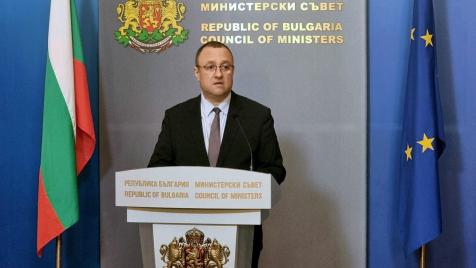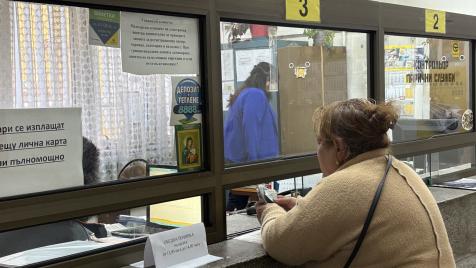“Poor planning”: The revenue problem was already evident when the budget was being drafted
Inflation, which began to rise amid speculation ahead of the adoption of the euro, proved to be a lifeline for the finance minister

© ECONOMIC.BG / BTA
The problem with the 2025 state budget and the significant revenue shortfall in the middle of the year is not so much the delay as the poor planning resulting from years of politically motivated budgets that are detached from economic reality.
This is the consensus among economists and financiers interviewed by Economic.bg after the Ministry of Finance (MF) and, more specifically, Finance Minister Temenuzhka Petkova came under fire in recent weeks for the low revenue performance in the 2025 budget.
The revenue side is too optimistic, and the problems are already visible because of this poor planning,” said Dimitar Chobanov, a financier and lecturer at the University of National and World Economy (UNWE).
He explained that against the backdrop of moderate economic growth and low inflation, the increase in budget revenues is not insignificant and is a good assessment of the work of the revenue administrations, but it lags significantly behind what was planned.
A similar opinion was expressed by Kaloyan Staykov, economist and chairman of the board of the Institute for Energy Management.
There is a lag in the pace of revenue growth. In previous years, it was faster in the first half of the year than what we are seeing now,” said Staykov.
According to him, this is “not surprising or strange” because when the budget was proposed, a number of experts warned that it was too optimistic in terms of revenue and expenditure and needed to be adjusted downward.
The most important goal in planning the budget and the fiscal-structural plan until 2028 was to meet, at least on paper, the deficit criterion. I don't see any other goal for this kind of planning because it was clear to almost everyone, including the Ministry of Finance, that this revenue plan was basically impossible to achieve,” Chobanov said.
Staykov pointed out that the big problem with public finances is not the lag in revenue or expenditure, but rather a “principle” issue.
The question is what role we want fiscal policy to play in the economic and political life of the country, and that is where the problems come from. In recent years, there has been a fiscal policy that is outside the general economic context and one that serves political goals rather than focusing on the economy,” said Staykov.
A unique situation... or not?
Such a large increase in revenue has never been planned before, and we are indeed in a unique situation,” Chobanov said.
According to him, however, there is one factor that could help the Ministry of Finance collect revenue: inflation.
The latest data from the National Statistical Institute (NSI) showed that in May, the average price increase in Bulgaria accelerated to 3.7% on an annual basis, and in the coming months, the upward trend will continue, supported by speculation surrounding the euro.
Inflation in Bulgaria is currently accelerating, and this is linked to the introduction of the euro, as confirmed by the National Revenue Agency,” Chobanov commented.
According to him, this will give the government some breathing space, because higher prices also mean more VAT revenue. This could also have an impact on wages, which the financier expects to increase by the end of the year, along with corporate profits.
However, Staykov believes that the situation is far from unique. He drew a comparison with the 2023 budget, which was adopted in the middle of the year and came into force on August 1, 2023, resulting in a budget shortfall at the end of the year.
The situation is not unprecedented; we have often seen politically motivated budgets that are far from economic reality and ultimately not implemented,” he said.
Ways to increase revenue
The 2025 budget relies on a number of exotic revenue measures, including combating the gray economy, corporate donations (which are lacking as of May), state-run grocery stores, and others. Recently, however, Petkova said that these measures would not take effect until the second half of 2025.
Chobanov sees the money from the Recovery and Sustainability Plan (RSP) as an opportunity to reduce the deficit.
This second payment under the RSP could serve to reduce the deficit, but only if the projects to be financed from it are postponed, which is not good news for the remaining payments,” warned the UNWE lecturer.
Another option is to cut capital program spending. According to Chobanov, the remaining payments from previous years could be postponed again, but this would not help much either.
We would like to remind you that this year's capital program amounts to BGN 14 billion, with less than BGN 7 billion implemented for 2024.
However, Staykov says that it will not make up for the shortfall in revenue, and cutting it will only help us stay within the 3% deficit. According to him, “cutting the capital program is the standard solution for any government,” and this year's program was so optimistic that it is “almost certain” that there will be some underperformance.
In the long term, however, this is the worst possible scenario, because it is precisely this program that is the tool for boosting economic growth.
Catching up on these revenues seems a little difficult unless some miracle happens, which is unlikely. Excuses about a “difficult legacy” and “the only possible budget” show a lack of desire for real reforms,” he commented.
Increase in the deficit
I expect the deficit to increase from July onwards," Chobanov predicted.
One of the reasons is that salary increases for various groups have already been approved, and others may in turn demand the same.
The likelihood of these demands being met is not small, but this commits not only the current budget but all budgets from now on," Chobanov said.
He recommended that from now on, the government should think about the sustainability and stability of public finances, as they are at risk.
Accounting games?
The question is what the figures will be at the end of the year. There is room for some accounting games, but the important thing is that revenues are insufficient," Chobanov said.
He explained that what is “weighing” on the budget is the expenditure side in the form of increases in pensions, health care costs, and salaries, and “there is no sign of any desire on the part of those in power to start limiting them.”
This is something that weighs not only on the current budget, but on every budget that follows it," warned the guest.
The reason is the automatic increase in pensions under the so-called “Swiss rule,” salaries for some budget-funded structures, and others.
Staitov reminded that the methodology for calculating the deficit and disclosing the data of the Ministry of Finance actually differs from the European one. While ours is on a cash basis, i.e., what goes in and out of the treasury, the European one is on an accrual basis, including expenses that are yet to be paid but have not been paid yet. Therefore, we will only be able to obtain complete information on the state of the treasury in the spring of 2026, when Eurostat will publish its statistics on the deficit on an accrual basis.
Update of the 2025 Budget
Chobanov predicts that a budget update can be expected.
It will depend on when the second major debt issue will take place in H2. If it happens in December, that will be good, but if it happens earlier, in the fall, it will be a bad signal for investors.
However, Staykov had a different opinion, as he believes that the Ministry of Finance has flexibility in implementing the budget, as well as opportunities to deviate from the adopted framework in different directions.
A budget update may not be necessary; it is a little early to make such forecasts at the moment,” said the economist.
According to him, if there is a problem, it will become apparent at the end of the year and usually in the fall, when capital expenditure payments increase sharply. But even if there is an update, the economist pointed out that this is not “something incredible” and that there is no stigma attached to it.
Translated with DeepL.

 Simona Gotsova
Simona Gotsova 




